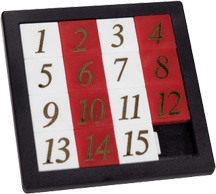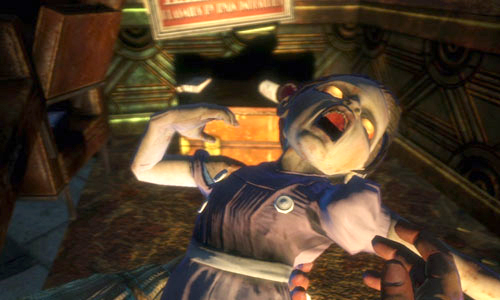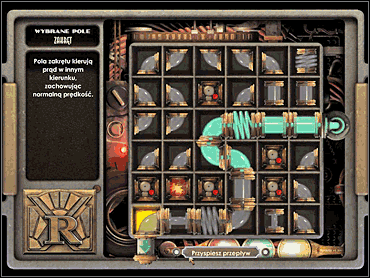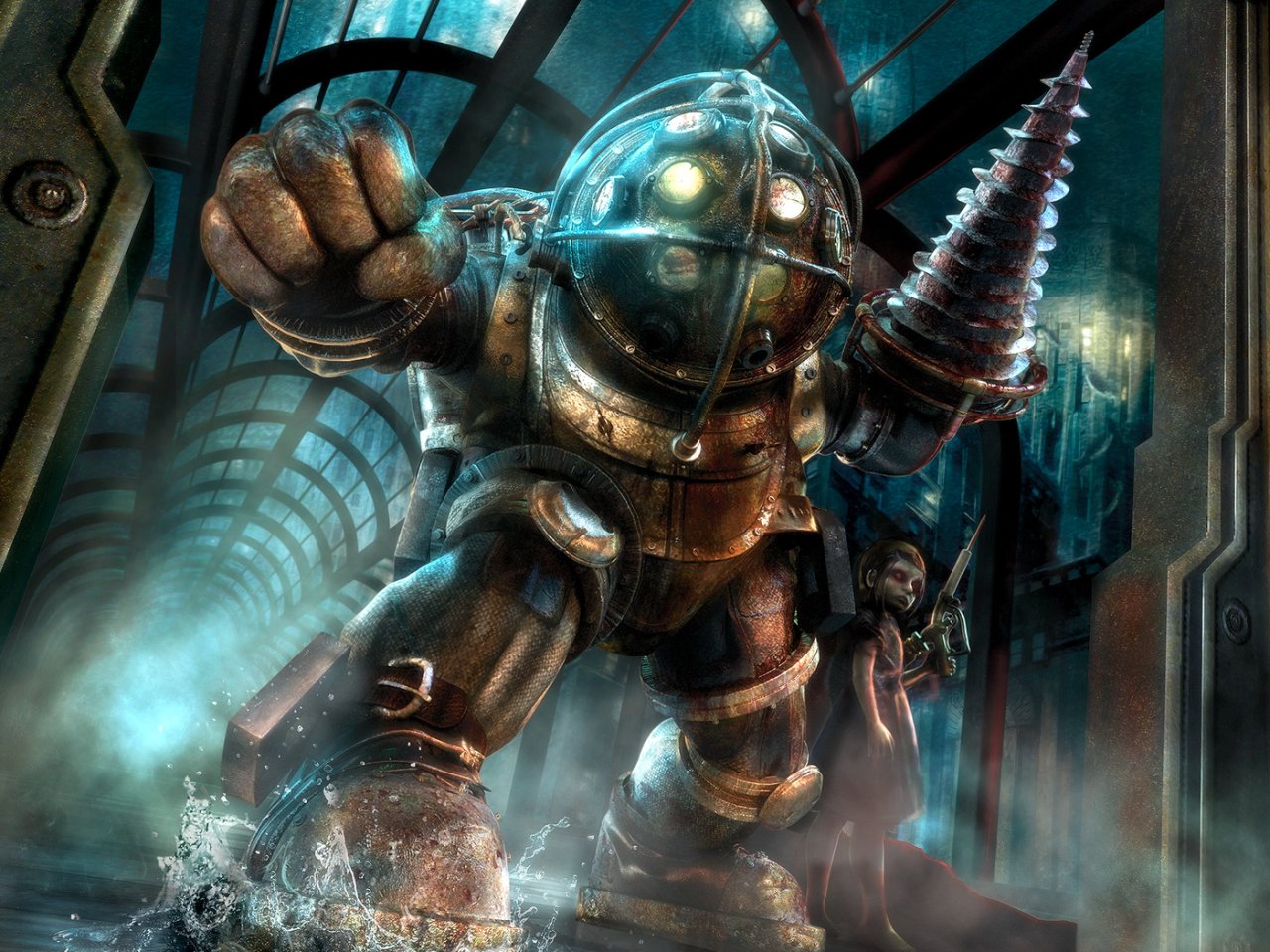Whenever I said Xbox, someone said Bioshock.
Xbox
Bioshock
Xbox
Bioshock
Not the most hardcore rap chorus ever, but once you’re doing singalongs you automatically lose a little street cred anyway, right?
Bioshock was the game you HAD to play. Even people who weren’t gamers, didn’t know a thing about games, had seen portions of it or experienced it in some way.
In the world of gamers, it’s also the game that comes up a lot when people discuss whether video games can be art.
No doubt, Bioshock is pretty to look at. The environment of the undersea city of Rapture has a fully-realized feel to it, and when combined with the carnival-like elements of the vending machines and the overall decay of the place as evidenced by leaking water and flickering lights, it’s hard not to be swept into the game straightaway. In fact, the first ten minutes of that game are likely the most memorable ten minutes of gameplay I’ve experienced in years.
Now, before I get further into this and say what I’m going to say, please keep two things in mind.
1. I do think this is a decent shooter and I applaud it for its steps towards a world of better games.
2. Ask yourself how long it’s been since you played Bioshock. This game came out 5 years ago. 5 years ago I was a young man who thought that a little more college and an annual rollerskating party would be the answer to all of life’s problems, and I was half right. 5 years ago I could probably log into some kind of Myspace. I’m just saying, it’s been a while, and if it’s been more than 3 years since you’ve played it, play it again and see if you still feel the same way about it.
After the first 10 minutes, I almost completely lost interest in Bioshock. I’m not a big fan of shooters, and this game is basically a shooter where you have a few more options and you’re shooting things in a more compelling environment. So to be fair, it’s not a game that’s really up my alley to begin with.
The environment is rich, but it seems that the game is using it primarily to elicit a fear reaction as opposed to a sense of awe. I am a human with somewhat of a nervous system, so if something is fast-moving and noisy, it will make me jump. But I object to this as a legitimate scare. The thing is, I’m equally scared by a pan falling off the kitchen counter when I’m in the living room. I’m in no danger whatsoever, nothing can actually happen, but it still makes me jump. So honestly, I don’t think that’s about fear so much as it is about reaction. I mean, if I made a game that was very dark, and the ending was a completely white screen, I would expect that you would squint, but I wouldn’t necessarily consider myself successful because I capitalized on a biological function.
Secondly, the game is pretty repetitive, most egregiously when hacking machines. Each machine, whether it be a vending machine, a robot drone, or a safe, requires hacking. And each hack looks somewhat like this:
Which is kind of the digital equivalent of this:

Which, if you are EVER handed one, goes immediately in this:
I absolutely hate it. It’s about the easiest thing you could do, game-design-wise, and the only reason I do it is because I’m shitty enough at first-person shooters that I require every item to make it through, or at least that’s how I try to play.
And how am I supposed to go from fighting for my life against this, a fully-designed, threatening and visually-stunning creature:
To working a tile-based puzzle that might net me 50 bucks. And this isn’t something that happens 5 or 6 times. There are DOZENS of these.
Also, I do not enjoy the robot turrets and obnoxious drones that are routinely kicking the shit out of me. What is their purpose in the game? What does their omnipresence add to my experience? How am I supposed to feel about this?
And FEEL is something that I really want to talk about here.
Bioshock, in case you’re like me and have never played, has been praised for a system that involves saving or harvesting childlike characters called Little Sisters. If you harvest (kill) a Little Sister, you get ADAM (just think about it like a type of currency exchanged for stuff as you go through the game) whereas if you free her, she transforms into a normal-looking little girl who thanks you and scampers away.
So the setup here is whether you’re going to be a good guy or a bad guy. Are you going to harvest the Little Sisters, make things a little easier on yourself, or are you going to save them and go through the game with slightly less currency?
Before long, this presents itself as a false choice. When I made the decision to save the first Little Sister I encountered, despite pressure from other characters in the game, I thought that this would be a fork in the road. I thought that there were really two Bioshocks, the one where you save the little sisters and the one where you harvest them. But after saving her, I found out that I still got SOME ADAM, and that another heretofore unintroduced character was prepared to reward me for saving the Little Sisters with even more ADAM, which leads me to ask, Does it matter?
I did a little internet pokearound, and that seems to be the common consensus. You do get a little more ADAM early on by being the bad guy, but the rewards for saving Little Sisters ultimately mean you get MORE ADAM by the end of the game.
I kind of hate that. How is that a choice? I mean, yes, the game gives you a choice to push X or Y, but it’s clear which choice is “right” and making the “right” choice is also the better choice in terms of your ability to complete the game.
That, to me, is really disappointing because it doesn’t seem like a realistic choice. Imagine you’re this guy who becomes ensnared in this Rapture situation, and when you get out you have to explain why you harvested the Little Sisters. An acceptable excuse would be, “Because if I didn’t, there is no way I would have survived and made it back to the surface. I made a decision for personal survival, which may have been immoral, but who can judge such a decision without being in my position?” An unacceptable excuse would be, “Well, I would have come out on top by not killing a bunch of little girls. But it would have been a little more of a pain in the ass, so I said, What the hell?”

To bring things back around, is Bioshock art, in my opinion?
Well, I know a lot of people have tried to define video games into and out of art, and that’s kind of a waste of time if you ask me. Because I think a lot of “art” is shit and a lot of things I enjoy are not considered artistic.
A few weeks ago I was at an art museum in Philadelphia when I should have been at a restaurant. What I mean is that I went to the art museum when I was already hungry, which I want to tell you now is a mistake.
If you’ve never heard of Maslow’s Hierarchy of Need, the idea there is that you need to fulfill certain needs in order to become “self-actualized” which is a fancy term for “able to do and enjoy things that are not related to survival.” Maslow’s idea is that you must first fulfill your physiological needs (food, shelter, etc.), then your safety needs (personal security, job security, health, etc.), then your sense of love and belonging, and finally your needs related to esteem (respect for yourself, others, etc.). THEN you’re ready to look at paintings and shit.
In Philadelphia, this became a stark reality for me. The hungrier I got, the less I cared about the art. At one point, surrounded by paintings and sculptures, I sat on a bench because all I wanted to do was round up my party and eat something. Anything.
What really great art does, for me anyway, is allow me to temporarily violate this hierarchy. If I’m watching a really great movie, I probably won’t notice hunger. Many times I’ve been reading a really great book and forced myself to stay awake in order to continue on. Just the other night I ignored the discomfort of having a bout of diarrhea in a bar bathroom in order to watch a favorite band play live.
If something has captured my attention, my senses, for any number of reasons, a lot of the rest of the world fades away.
Video games have definitely taken me there, so to me, they are absolutely art.
How GOOD of art they are can be determined by what I felt, how strongly it was felt, and whether the game could convince my body to ignore itself a little bit.
Bioshock, I’m afraid, has not been successful in this arena. I haven’t felt much but fear, and as I said before, it’s not a kind of fear that resonates with me.
Other than fear, I feel the emotions of someone playing a video game, which is mostly annoyance at the repetitive parts, annoyance that my primary use as a character seems to be fetching things, and ultimately, annoyance that I will finish the game just to see what happens.
Which brings us to something else entirely.
I read this short interview with programmer Jonathan Blow the other day, a guy who is well-known for being right and being…often less than diplomatic about it. Here’s an excerpt describing Blow’s feelings on World of Warcraft:
Mr Blow believes developers need to think about what their games are teaching players when they reward them for performing certain actions.
“That kind of reward system is very easily turned into a Pavlovian or Skinnerian scheme,” he says. “It’s considered best practice: schedule rewards for your player so that they don’t get bored and give up on your game. That’s actually exploitation.”
Developers should provide activities that interest players “rather than stringing them along with little pieces of candy so that they’ll suffer through terrible game play, but keep playing because they gain levels or new items”, he says.
“I think a lot of modern game design is actually unethical, especially massively multiplayer games like World of Warcraft, because they are predicated on player exploitation,” Mr Blow says.
He believes players will naturally avoid boring tasks but developers “override that by plugging into their pleasure centres and giving them scheduled rewards and we convince them to pay us money and waste their lives in front of our game in this exploitative fashion”.
He said developers should design innovative, ethical and personal art because players are hungry for inspiring new games.
This, to me, is maybe the most relevant criticism I’ve heard of modern gaming in quite some time. I think he’s completely right. In Bioshock, I don’t want to BUY shit. I don’t want to repeatedly hack robots who have no personality or purpose other than to slow down the gameplay and interrupt my connection to this other world.
The gameplay and mechanics of Bioshock are actually quite good, but in a lot of ways they interrupt the art of the piece. Which MAY be the fundamental problem with video games being art, although one could make a pretty good argument against that.
As someone who has been to a good half-dozen high-profile art museums, I can tell you that almost every single one is fairly labyrinthian. I’ve never seen one designed as one long hallway with pictures hanging on the walls, which would be the simplest and most efficient way to do it. Instead, they build buildings that encourage exploration. It can be frustrating sometimes, especially if you want to see something specific. But if you make repeated visits to your hometown art museum, it’s great.
Art can be contained within something that challenges you a little bit. Art doesn’t have to be easy to access, and making it difficult to access does not negate its artistic status. Within reason, that is.
I’m talking about intersecting rooms, winding hallways and alternative staircases. I’m not talking about solving a small puzzle before you are allowed to see each art piece.
If museum visitors had to solve a small puzzle before viewing the Mona Lisa, the Mona Lisa would still be art. But I would guess that most visitors would be upset that there was an unnecessary barrier there, especially if said barrier had no real connection to the art piece other than to delay gratification.
That’s what the gameplay of Bioshock feels like to me. I feel like I’m enjoying the world of it, enjoying uncovering exactly what happened, but I’m constantly being interrupted by bland puzzles, required ingredients of no inherent interest, and firefights with very low stakes.
There is art in Bioshock. But if the world was mine to make, I would make Bioshock a world that was explored without the need to fire weapons that I’ve seen many times before, a world that would be explored without an item-purchasing component that forces you to look inside every crate and box for a few bucks. I guess, if it were up to me, I would see Bioshock become more art and less game.
Fortunatley, it’s not up to me, and it may not have to be a choice between art and video game. Others have an answer.
In the middle of playing Bioshock, I decided to download Jonathan Blow’s game, Braid. On first glance, it looks like any side-scroller. But check this out:
What really interested me was the final question:
“Then what would you be?”
Not “What would you DO?”
“What would you BE?”
At the game’s opening, the player reads a series of text screens. Here is the text displayed in the first few moments of playing Braid:
“Tim is off on a search to rescue the Princess. She has been snatched by a
horrible and evil monster. This happened because Tim made a mistake.”
“Not just one. He made many mistakes during the time they spent together, all
those years ago. Memories of their relationship have become muddled, replaced
wholesale, but one remains clear: the princess turning sharply away, her braid
lashing at him with contempt.”
“He knows she tried to be forgiving, but who can just shrug away a guilty lie,
a stab in the back? Such a mistake will change a relationship irreversibly,
even if we have learned from the mistake and would never repeat it. The
princess’s eyes grew narrower. She became more distant.”
“Our world, with its rules of causality, has trained us to be miserly with
forgiveness. By forgiving them too readily, we can be badly hurt. But if we’ve
learned from a mistake and became better for it, shouldn’t we be rewarded for
the learning, rather than punished for the mistake?”
“What if our world worked differently? Suppose we could tell her: ‘I didn’t
mean what I just said,’ and she would say: ‘It’s okay, I understand,’ and she
would not turn away, and life would really proceed as though we had never said
that thing? We could remove the damage but still be wiser for the experience.”
“Tim and the Princess lounge in the castle garden, laughing together, giving
names to the colorful birds. Their mistakes are hidden from each other, tucked
away between the folds of time, safe.”
Braid, like most games, involves running around, jumping, and collecting.
But Braid, unlike most games, isn’t ABOUT running around, jumping, and collecting.
If someone asked me about Bioshock, I would describe it as a very pretty first-person shooter. If someone asked me about Braid, I would say it’s about regret.
I don’t mind saying that I started to get misty reading those first few passages from Braid. Because honestly, a world where we could still go through the necessary process of learning from our mistakes without being punished for them is a very compelling idea, and one threaded with a kind of sadness that makes a lot of sense to me. This is a game that feels like it started as an emotion, and the game designer expressed his emotion through the lens of a video game rather than a series of tasks with a story laid over the top of it. Emotion expressed through a medium? Sounds pretty damn artistic to me.
More than that, Braid feels real to me where Bioshock does not, despite the fact that Bioshock certainly looks and sounds more like a reality I know. In terms of narrative, in terms of being a personal piece of art, the message of Braid feels to me to be that even someone who posesses amazing power is unable to change some of the most important things about life.
Going back to my personal definition of art, I stayed up WAY too late playing Braid. Instead of Bioshock.
I didn’t mean for this to turn into a Bioshock bash session. Honestly, I’m glad it was such a memorable experience for so many people, and it’s a good game overall. It works. And as a final proof of art, art is very subjective. You know someone who has a hideous painting hanging in his house. You know someone who loves an unlovable piece of art because her husband made it. You would frame something that someone else would roll up and throw in the trash.
If you loved Bioshock and feel that it is the ultimate example of art in video games, I’m not prepared to argue with you. But when I build my museum of gaming art, it seems that Bioshock will likely occupy the section of historically significant but less bold portraits while Braid will find a home in a much more emotionally charged locale.
In the interest of full disclosure, I haven’t finished either game. But I’m going home now. To play Braid.



